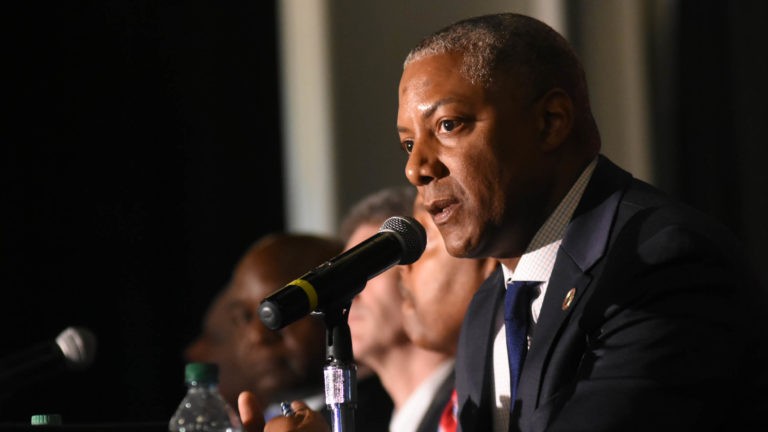By Solomon Crenshaw Jr.
Wayne Wooley’s question cut to the heart of the Sewer Town Hall gathering Monday night at Regions Field.
“What did I do? What did my church do to deserve all this?” the 72-year-old Crestwood South resident asked. “Tell me why you’re putting all this burden on us? I’m on a fixed income. That’s to me illegal.”
Two and a half hours proved not to be long enough for the event, sponsored by County Commissioner Lashunda Scales.
Many of the 400 people who came to the ballroom at Regions Field stayed to the very end, having heard county officials and representatives from the Birmingham Water Works talk about the county’s 2013 bankruptcy settlement, the sewer rate schedule, the financial status of the county and the future.
Reviews were mixed as people left the ballpark at 9 p.m. Some were happy to have had an opportunity to ask questions and to have their voices heard. Many were displeased with responses, concerned that rates are already challenging for those on fixed incomes.
Chandler Thomas of the Tarrant area said he was not totally satisfied but “it’s a good beginning. I wanted to see some help for those who are less fortunate.
“It’s a process,” Thomas continued. “The process has begun, and that’s a good thing.”
County Manager Tony Petelos said the No. 1 issue was affordability.
“That’s not only an issue here. It’s an issue nationwide,” he said. “This issue is not unique for Jefferson County. It is an issue that is across the country as utility rates continue to rise.”
Michael Johnson knew when he walked into the ballroom at Regions Field Monday night that he would be viewed as one of the bad guys.
Such is the lot of the general manager of the Birmingham Water Works when people talk about rising water and sewer rates.
“The water business and the sewer business are very expensive businesses,” said Johnson, citing regulations governing drinking water. “That may be the case, that we’re bad guys, but generally the business is expensive and in order to maintain the quality water and to make the repairs to facilities, you have to have rate increases to where we’re only charging what we need to operate daily and also what we need to maintain the system, including all the regulatory requirements.”
John Henry, the chief financial officer for Jefferson County, wasn’t surprised that many of the questions revolved around how the county got into its current state and whether ratepayers can get some relief.
“We do recognize that this is a very sensitive issue,” he said. “We do recognize that these automatic rate increases for someone that’s on a fixed income is very difficult for folks to understand.
“I don’t know if we’ve, in the past, done a well enough job at least of just letting people know why we’re in the position we’re in, and what they can expect, at least from a transparency perspective.”
Henry acknowledged that some answers left those in the audience dissatisfied.
“Some of the answers we gave, obviously, were not as clear as folks would have liked, because we just don’t know exactly what the future will hold,” the CFO said. “But what we do know is that … we try every day to make sure that we’re putting this county on the best financial footing possible so if we do have the opportunity to refund in the future, we can get the lowest rate possible.”
West End’s Twinkle Cavanghn was among dozens who stepped to the microphones to cite her difficulty with rising sewer and water rates.
“I hate I moved there,” she said. “This is ridiculous.”
Sherrell Thomas recounted how her late mother would avoid flushing her toilet because she feared the high bill that would come as a result.
“You don’t want to flush the toilet because of the increased rate,” the West End resident said. “That’s not right.”
State Rep. John Rogers, D-Birmingham, expressed a repeated concern that county Districts 1 and 2 are shouldering the load of the sewer rate increase because a number of suburban areas use septic tanks rather that the sewer system.
“If (Districts) 1 and 2 cannot pay the debt, who pays that?” Rogers asked.
Bob Freeman cited a study that said that more than 60 percent of what’s treated comes from outside of Districts 1 and 2, in places beyond where trunk lines are located.
“Regardless of whether people have a septic tank or not, it’s where the (water to be treated) comes from,” he said, including golf courses, roofs and roads. “We’re referring to what the sewer system has to deal with and where the source comes from.”
Monica Romano said she came to Regions Field seeking a better understanding of the situation.
“I do feel that I’m leaving this evening with a much better understanding,” the Southside resident said. “This is the first time I’ve been part of a conversation about water rates. Any time the community has a chance to come together to communicate, we’re better for it.”
The meeting was about two hours old when Scales stepped to the podium and asked if those present were satisfied. She had panelists give their phone numbers so questions can be addressed going forward.
“Hold us accountable,” she said. “Tonight is about the sewer and having a voice.”

